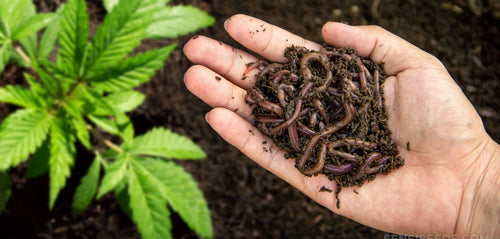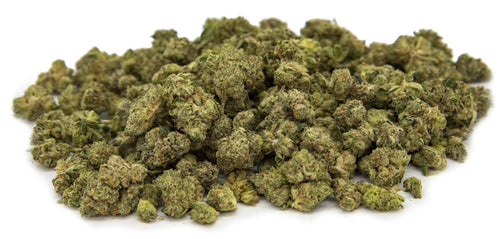#86: The ABCs of THC: What Your Parents Didn't Tell You
#86: The ABCs of THC: What Your Parents Didn't Tell You
Your parents may have warned you about the "dangers" of cannabis, but what did they really mean? The truth is, cannabis has over a hundred different compounds, each with their own unique effects and potential benefits. Most of the buzz (and stigma) surrounding cannabis revolves around one compound in particular - tetrahydrocannabinol, or THC for short.
As the main psychoactive component of cannabis, THC has been both celebrated and demonized for its effects on the human body. From euphoria to potential dependence, there's a lot to unpack when it comes to THC.
To help you better understand this complex compound, let's dive into the science behind THC and its effects on the human body. So, put on your lab coats (figuratively speaking) and get ready to learn about all things THC!
From stigma to science

Tetrahydrocannabinol (THC) is the principal psychoactive constituent of cannabis and one of at least 113 cannabinoids identified in the plant. Typically referred to as delta-9-tetrahydrocannabinol (Δ9-THC), THC is a colourless oil at room temperature but can appear as a yellow or brown wax-like substance when isolated.
THC interacts with the body’s endocannabinoid system (ECS), a complex network of receptors and molecules that regulate various physiological and cognitive processes. This system includes cannabinoid receptors, mainly CB1 and CB2, which are distributed throughout the brain and body. THC binds to these receptors, triggering a chain of events that can impact mood, memory, pain perception, and more.
If you've ever consumed cannabis, you're probably familiar with the feeling of being "high" - that euphoric and relaxed state often associated with THC. This is because THC activates CB1 receptors in the brain's reward system, causing an increase in dopamine levels (the neurotransmitter responsible for pleasure and motivation).
But it's not just about getting high. Interacting with the CB2 receptors, THC also has potential anti-inflammatory and pain-relieving effects. This is why it has been used in medical treatments for conditions like multiple sclerosis, Crohn's disease, and chemotherapy-induced nausea and vomiting.
How THC works in the body

How THC is absorbed, metabolized, and eliminated by the body can greatly impact its effects. When consumed orally (edibles), THC is absorbed through the intestinal wall, metabolized in the liver, and then released into the bloodstream. This process takes longer to feel effects (up to 2 hours) but also prolongs their duration (up to 8 hours).
When inhaled (smoking or vaping), THC is rapidly absorbed through the lungs and directly enters the bloodstream. This results in quicker onset of effects (within 3-10 minutes) but shorter duration (usually up to 3 hours).
Topicals (creams, lotions) deliver THC through the skin and have a slower onset of effects (up to an hour) but can provide localized pain relief without any psychoactive effects, while sublingual consumption (under the tongue) provides a faster onset of effects compared to edibles.
THC and its metabolites can be detected in various body fluids, including blood, urine, and saliva, for varying lengths of time depending on the method of consumption, frequency of use, and individual metabolism. This can range from a few hours to several weeks.
Therapeutic uses of THC
It's not just about getting high - THC has shown potential medical benefits as well. While more research is needed, there is evidence that THC can be effective in reducing symptoms of certain medical conditions. Here are some examples:

Pain Relief: THC has been shown to be effective in reducing chronic pain, particularly neuropathic pain.
Anti-inflammatory: THC has anti-inflammatory properties that can help alleviate symptoms of conditions such as arthritis and Crohn's disease.
Appetite Stimulation: THC is known to increase appetite, making it beneficial for those undergoing chemotherapy or suffering from eating disorders.
Nausea Relief: Similar to its effects on appetite, THC can also help reduce nausea and vomiting, particularly in cancer patients undergoing chemotherapy.
Improving Sleep: Many medical cannabis users report improved sleep with the use of THC. It may also be helpful in treating sleep disorders such as insomnia.
Neuroprotection: Some studies suggest that THC may have neuroprotective properties, potentially benefiting conditions like Alzheimer's disease.
Mental Health: While the effects of THC on mental health are still being studied, some research suggests that it may be beneficial in treating symptoms of conditions like PTSD and depression.
There is much more to this compound than meets the eye. While its recreational use may be more well-known, THC has shown potential in providing relief for a variety of medical conditions. As the stigma surrounding cannabis decreases and more research is conducted, it's likely that we will continue to uncover even more potential medical benefits of THC.
THC dosage guidelines
The type of product you consume, the method of consumption, and your own tolerance all play a role in determining the appropriate dosage of THC. For beginners, it's recommended to go low and slow, starting with a small dose and gradually increasing if desired effects are not achieved. The following dosing guide for beginners is often suggested:
|
Product Type |
THC Dosage Recommendation for Beginners |
Time to Feel High |
Duration of High |
Potential Benefits |
|
Edibles |
2.5 - 5 mg |
30 minutes to 2 hours |
4 - 8 hours |
- Long-lasting relief - Can feel effects throughout head and body |
|
Flower for smoking |
Less than 20% THC, one puff |
Almost immediate |
1 - 3 hours |
- Quick relief - Easier to titrate dose during the session compared to edibles |
|
Vapes |
70% THC or less, one puff |
Almost immediate |
1 - 3 hours |
- Quick relief - Less harsh on the lungs than smoking - Easier to titrate dose during the session compared to edibles |
|
Tinctures |
2.5 - 5 mg (per dose) |
15 - 45 minutes |
2 - 4 hours |
- Precise dosing - Easy to add to foods or drinks |
|
Concentrates |
70% THC or less, half a grain of rice |
Almost immediate |
1 - 3 hours |
- High potency - Used sparingly for strong relief |
This is just a general guide, as dosing can vary greatly between individuals. What you consume, how often you consume it, and your tolerance levels all impact the effects of THC. Give yourself time to experience and understand how THC affects your body before increasing dosage. Once you've established your tolerance, you can experiment with different dosages to find what works best for your specific needs and preferences.
Safety tips for using THC
As much as THC can provide relief and enjoyment, it's important to be aware of potential risks and side effects. While generally considered safe, THC can have some side effects such as dry mouth, dizziness, and impaired motor skills. It may also have interactions with certain medications. Some other potential risks of THC include:
Psychoactive effects: THC can cause euphoria, anxiety, paranoia, and altered perception of time and space.
Cognitive effects: It may impair short-term memory, attention, and decision-making abilities.
Dependence and tolerance: Chronic use can lead to tolerance and dependence, with withdrawal symptoms upon cessation.
Psychiatric disorders: Heavy use of THC has been associated with an increased risk of developing psychotic disorders, particularly in individuals predisposed to such conditions.
Highlighting these potential risks is not meant to discourage the use of THC, but rather to emphasize the importance of responsible and informed use. As with any substance, moderation and caution should be exercised, especially if you're not accustomed to its effects.
The final word on THC
While your parents were likely taught to fear THC, it's clear that this mighty cannabinoid has plenty of beneficial properties. It's not just about getting high; THC has proven to be a valuable tool in managing pain, inflammation, and other health conditions.
As the stigma around cannabis continues to decrease and more research becomes available, we can one day hope for a more comprehensive understanding of THC and its role in our health and well-being. Until then, enjoy the myriad of ways in which THC can enhance your life, and always remember to consume responsibly.
Back to all posts









